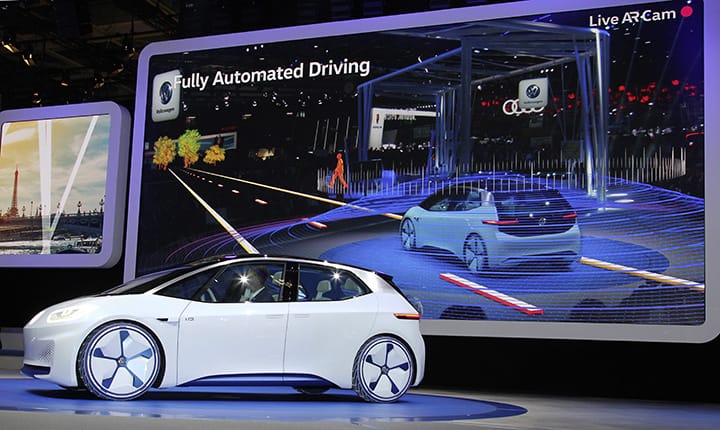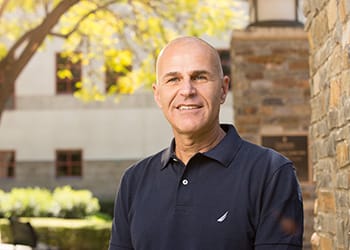CISAT’s Tamir Bechor Partners with Volkswagen to Co-Found Auto Cyber Security Firm

Hack to the Future: CISAT Professor Tamir Bechor is driving cyber security solutions for the cars of tomorrow
Within 10 years, experts say, virtually every new car in the country will be connected . . . to everything: our smartphones, laptops, the Internet, other cars.
And some will be able to drive themselves.
But the technology that will make all this possible could—in the hands of hackers or terrorists—be used to endanger motorists, turn vehicles into self-propelled weapons, access consumer data, and disrupt businesses’ operations.
CGU’s Tamir Bechor is gearing up to meet this looming threat.

A professor in the Center for Information Systems and Technology (CISAT), Bechor is teaming up with other top Israeli experts in collaboration with the Volkswagen Group to develop the next generation of cyber security solutions for connected vehicles. The launch of Cymotive Technologies as auto manufacturers and other businesses begin ramping up for the next revolution: vehicles that are completely autonomous, or self-driving, and fully connected to Internet- and cloud-based networks, applications, and services.
“This is the biggest shift since we invented the vehicle,” Bechor said. “Cars in the future will be running on software—not fuel. Your car is a computer on wheels.”
For hackers already capable of remotely infiltrating and taking control of vehicles currently on the road, the cars of the future will present tempting targets and near-endless possibilities.
“The Internet on Wheels”
Such issues figure prominently in Bechor’s classes. A transdisciplinary course he is currently teaching this fall, “Cyber Security Risk Management,” covers the rapidly changing ecosystems of technology and information to make students aware of the trends and understand rising threats.
“Cyber criminals are stepping up their game and cyber breaches are becoming more common and devastating,” Bechor said.
Modern cars—sophisticated devices housing the equivalent of roughly 60 computers and already outfitted with many connected features—are already vulnerable. Most automotive companies expect to have self-driving cars on the road by 2021. Tesla, Google, and Apple have been testing their self-driving prototypes for several years.
“Today, in any car you can use a mobile device to open a car’s doors, find out where the car is located, etc.,” Bechor said. “It’s almost like an iPhone on wheels.”
Earlier this year, Chinese researchers were able to take control of a Tesla Model S from 12 miles away while the car was in motion. In 2015, a pair of cyber security experts demonstrated to WIRED magazine that they could wirelessly hijack a Jeep Cherokee (see video below).
Against a backdrop of leaked emails (2016 Democratic National Committee) and hacked social media (Mark Zuckerberg’s Twitter and Pinterest accounts), such hacks—for research or criminal purposes—are expected to escalate, Bechor said.
In 2015, President Barrack Obama described cyber threats as a “challenge to our national security.” The US Department of Justice this year created a working group to examine cyber attacks, singling out hacks against cars—“the Internet on wheels” as Assistant Attorney General John Carlin described vehicles—as a specific concern. General Motors CEO Mary Teresa Barra recently described car hacking as “a matter of public safety.”
Industry Shifts
The technology behind these trends has been unfolding over the decades.
And as the industry shifts from standard Wi-Fi to car-to-cloud connections, the future holds greater possibilities for improved motorist and pedestrian safety, reductions in traffic, and improved driving experiences, according to industry experts and researchers.
“I believe within one decade, most cars will be driverless,” Bechor said. “It seems like science fiction, but it’s not.”
Car manufacturers are disrupting the industry by getting consumers to think of transportation as a service-on-demand, rather than an asset to own.
By 2021, more than 380 million connected cars are estimated to be on the road, according to a June 2016 report by Business Insider Intelligence.

The on-demand transportation service continues to heat up: BMW has created its own car-on-demand services. General Motors was an early investor in a company called Turo, and has made a $500 million investment in Lyft. Ford has an interest in Getaround, while VW made a $300 million investment in Gett. Daimler acquired Uber competitor RideScout in 2014.
Add to that developments in connectivity that will provide consumers with traffic information, parking assistance, fuel consumption optimization, maintenance reminders, collision protection, fatigue detection, and social media and smartphone interfaces.
“Because of these big opportunities, we see big threats, a dark side,” Bechor said.
“This is About Trust”
Bechor will be teaming up with other top Israeli experts such as Yuval Diskin, the former head of the Israeli Security Services, and Tsafrir Kats, a 27-year veteran of Israel’s Ministry of Defense, to launch Cymotive. The firm will be based out of Israel and Germany.
“We are thrilled about this new venture for Tamir, but at the same time we are not surprised because Tamir has long been at the cutting edge of cyber security,” CISAT Director Tom Horan said.
Cymotive will be developing a full cyber security platform for all of Volkswagen Group’s future lines of autonomous and connected vehicles. As a market leader, Volkswagen owns Audi, Bentley, Bugatti, Lamborghini, Porsche, and overseas-brands SEAT and Skoda.
“Tamir is a prime example of someone who is not only inspiring inside the classroom as far as his passion and knowledge about cyber security, but then he hops on a plane and travels the world helping industries and organizations solve the technological challenges they are facing,” Horan said. “And the richness that brings back to the classroom is just tremendous.”
Bechor’s work with Cymotive underscores how improving cyber security has emerged as a top priority for business and political leaders.
“This is not about safety or security,” Bechor said. “This is about trust and confidence of societies in cyber space.”